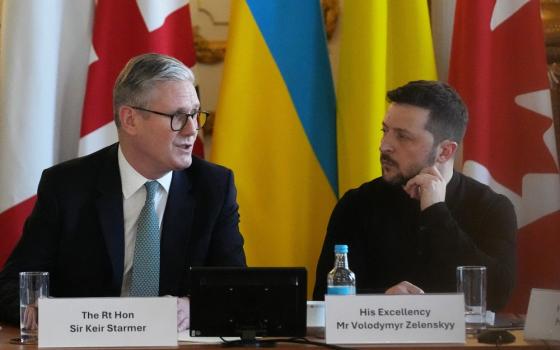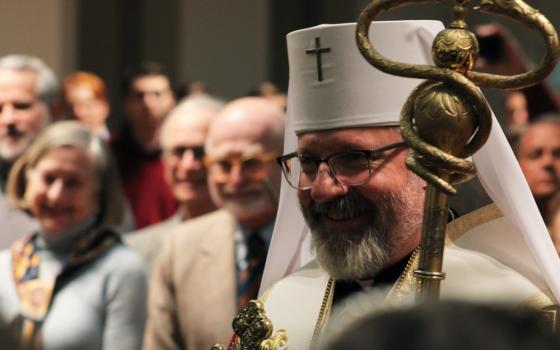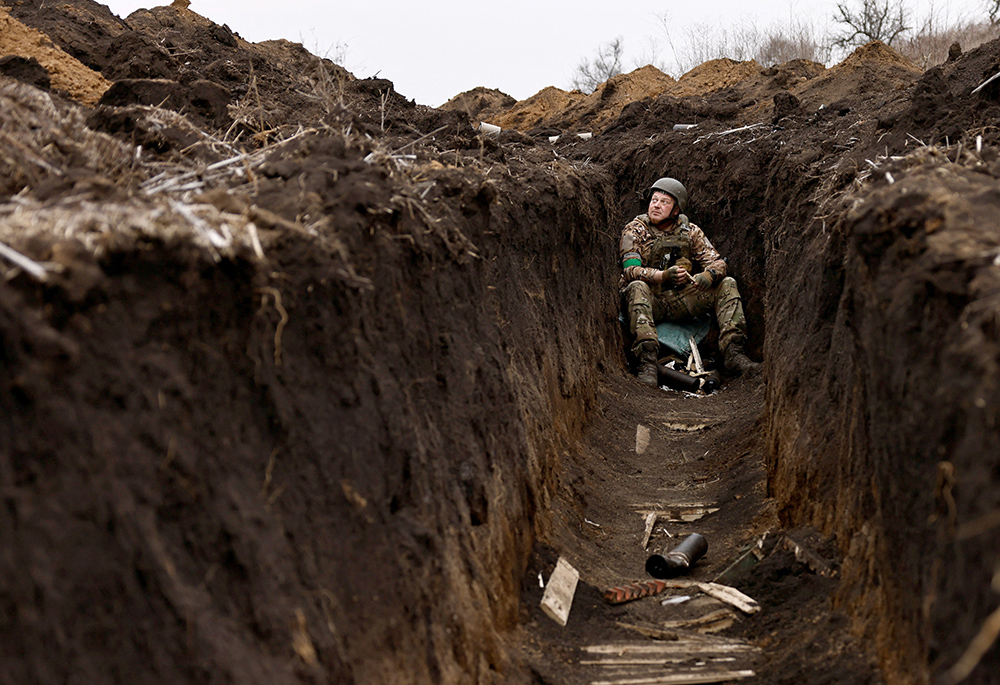
A Ukrainian soldier listens to artillery fire from his bunker at a front-line position near Bakhmut March 16, amid Russia's attack on Ukraine. (OSV News photo/Reuters/Violeta Santos Moura)
Catholicism in the last years has put just war theory on the docket. But Christian nonviolence now faces a moment of challenge, too.
In 2016, the Catholic Nonviolence Initiative, a project of Pax Christi International, called for the Catholic Church "no longer [to] use or teach 'just war theory'." A skeptic himself of the theory, Pope Francis has nevertheless declined to rule out its use. Even so, in 2017 he insisted in unprecedented papal fashion on the central place of nonviolence in the Christian life: "To be true followers of Jesus today also includes embracing his teaching about nonviolence."
This emphasis on nonviolence has stimulated throughout the church an indispensable reflection attuned to matters ranging from the outrage of American gun violence to the imperative of nuclear disarmament.
But in the last year, these unfolding developments have also collided awkwardly with history. In an act evoking the crime of aggression last tried at Nuremberg, Russia invaded and brutally occupied Ukraine. Facing impossible odds, the Ukrainians deployed their military and fought back.
The Ukrainian decision to fight offers an opportunity to evaluate claims of Christian nonviolence in the face of Russian aggression — an aggression notable for seeking regime change, justifying itself with eliminationist language and committing widespread war crimes.
I have argued that Ukraine is right on just war grounds to be defending itself against Russian aggression. While I support many aspects of the church's turn to nonviolence in the last years, I believe that the response of Christian nonviolence to the war in Ukraine has been flawed, not only because it has been powerless to stop the aggression but also for conceptual reasons.
Three conceptual challenges for a Catholic ethic of nonviolence raised by the war in Ukraine include to engage just war theory on its own terms; to engage the price and purpose of Ukrainian sovereignty; and to find a better story.
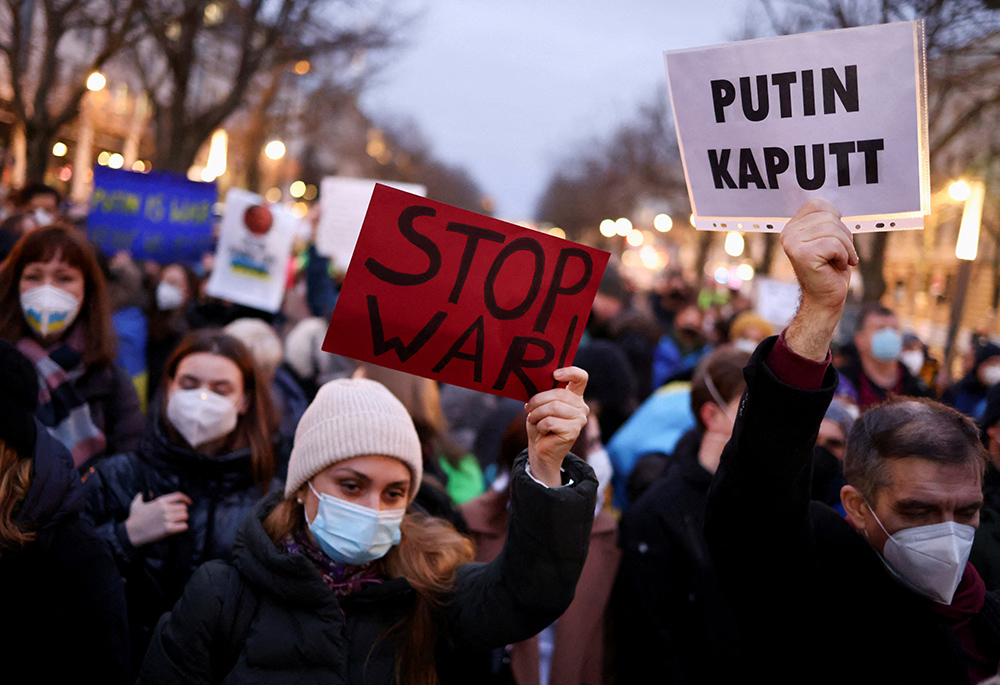
Demonstrators in front of the Russian Embassy Feb. 22, 2022, in Berlin hold placards during an anti-war protest. (CNS/Reuters/Christian Mang)
Misuse of just war theory?
In a February conference sponsored by Blackfriars Priory in Oxford, Ukrainian Dominican Fr. Petro Balog of the Institute of Religious Sciences of St. Thomas Aquinas in Kyiv rejected the word "war" to describe his country's response to the invasion. "War," he said, is what the Russians are doing. Ukraine, he specified, was engaged in a "just defense."
Balog's word choice reflects important Catholic concerns of the last years about a rhetoric and reality of war running out of control. His comments also point to the moral core of just war theory, which, for all its misuse, is meant for the defense of the common good of a political community consistent with the demands of human rights and the international common good.
The Catholic Nonviolence Initiative has argued that just war theory "has been used to endorse rather than prevent or limit war." But however badly it has been used, it's important to engage the theory on its own terms in order to say why it should no longer be taught or used. And Ukraine's "just defense" provides an occasion to do precisely that.
At a March 28 conference cosponsored by the University of Notre Dame and the Ukrainian Catholic University, Notre Dame scholar Daniel Philpott said that peace activists were rightfully concerned about loss of life in the war but wrongly missed the political dimension to the conflict made evident especially in the emergence of a Ukrainian people and their common good after centuries-long struggle. "It is the common good rather than lives alone that is the basis for the most fundamental tenet of international law and the just war ethic," he said.
Last September, Pope Francis used a similar moral logic when he said of Ukraine's decision to fight: "To defend oneself is not only licit, it is also an expression of love toward one's homeland."
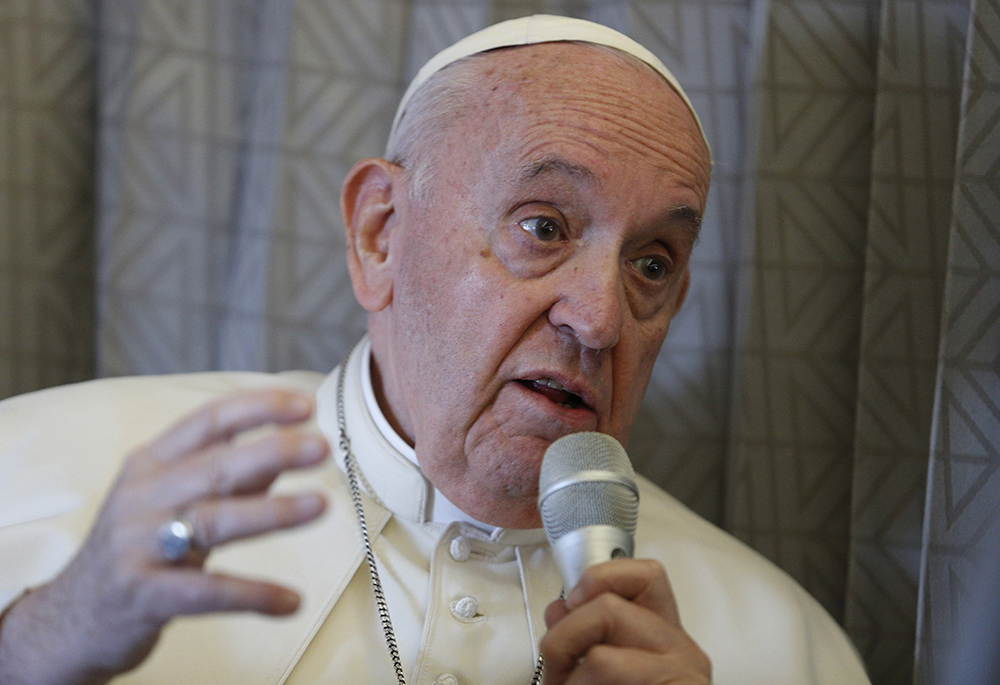
Pope Francis answers questions from journalists aboard his flight Sept. 15, 2022, from Nur-Sultan, Kazakhstan, to Rome. Francis said to reporters: "To defend oneself is not only licit, it is also an expression of love toward one's homeland." (CNS/Paul Haring)
Pacifists and political sovereignty
In the language of international law, aggression is a crime because it violates political sovereignty and territorial integrity. In turn, such sovereignty is justified by the degree to which it protects the life, liberty and human rights of those living under its authority. What is the status of political sovereignty — or the claim of ultimate governing authority over a territory — in responses to the Ukraine war by advocates of Christian nonviolence?
One kind of response arises from a radical, pacifist critique. In this view, the notion of political sovereignty at all is bound to a lust for domination and war whether the sovereignty in question belongs to Ukraine or Russia or any other state. In a powerful article in Commonweal about the war, Paul Griffiths articulated this perspective when he said of any claim by a state to sovereignty: "They want what they want, and kill for it, combatants and non-combatants both. … That is what all sovereign states do when they can."
But the distance is short between a sinful choice for irrepressible violence and a slide into a determined world of destructive force where sovereignty is simply a power game. The philosopher Michael Walzer wrote of this problem when he said: "If one insists that all wars on all sides are acts of conquest or attempted conquest, or that all states at all times would conquer if they could, then the argument for justice is defeated before it begins and the moral judgments we actually make are derided as fantasies."
The anti-Ukraine-war position of the anarchist Catholic Worker movement shares in the rejection of the principle of political self-rule on account of the destructively violent practices of the modern state in the age of capitalism. In this version of opposition to the war, Ukraine may have been unjustly attacked but defending its sovereignty isn't a justification to fight. In fact, such defense is the apple hanging from the tree that, once plucked, leads to the inevitability of war and the impossibility of peace. Here the feel is biblical and apocalyptic: The peace demanded by Christ finds no home in the pretensions of earthly sovereignty. Here also a hard question lingers: How will millions of Ukrainians be protected from an invading, eliminationist army?
Advertisement
Scholar and activist Eli McCarthy has a more congenial if still limited approach to Ukrainian sovereignty. To be sure, he affirms the Ukrainian right to political self-determination. Moreover, his scholarly work on "just peace" makes a powerful case for the potential of Christian nonviolence to transform situations of great conflict in which political rule is at stake. He writes of heroic examples of Ukrainian nonviolent resistance (e.g., blocking Russian military vehicles and protesting against Russian occupation). But the numbers of such examples are small and sanguine relative to the widespread, brutal occupation of Ukrainian territory. Moreover, his appeal to the transformative efficacy of nonviolence draws on examples more pertinent to intrastate conflict than to the overwhelming and indiscriminate displays of force common to interstate conflict.
The effect of this mismatch between an intrastate nonviolent remedy and an interstate brutal war is to diminish the nature and gravity of the challenge facing millions of Ukrainians whose long-sought sovereignty was meant perhaps more than anything to protect them from Russian predation. The road to the Maidan Revolution of Dignity in 2014 goes back centuries and has resulted in a Ukrainian civic identity that views "the state as defined by a set of shared values to which people of all ethnicities may subscribe." If the first goal of their sovereignty was to create such a state, then the second was to draw on sovereignty to defend such a civic identity in the face of a haunting past threatening to irrupt anew in the present.
In his bestselling Bloodlands, historian Timothy Snyder documents the predations of the last century that have blocked the path to Ukrainian sovereignty while also making it that much more valuable: 3.5 million Ukrainians killed by Stalin; another 3.5 million killed by Hitler; and 3 million more who died in combat or otherwise in World War II.
Has Christian nonviolence sufficiently valued the price and purpose of Ukrainian sovereignty?
Empire, accountability and agency
Ethics often embeds itself in a story. There are the principles, norms and virtues of a particular kind of ethical thinking. And then there is a story into which the ethics fit. The story could be from the Gospels or from history. Wherever it is from, its purpose is to show how the ethics make sense.
I note this because of a common, questionable feature of work about the war in Ukraine by writers on Christian nonviolence: the assumption of a link between an ethics of nonviolence and a story of empire — in this case, primarily of American empire. There are different versions but largely the same story: The origin and ongoing nature of the war in Ukraine is to a substantial extent due to American imperial overreach. Without NATO expansion driven by American imperial ambition, Russia would never have launched the war. Without a hegemonic Anglo-American desire (the British and Americans are often combined in this story) to weaken Russia's military and sell weapons, the war would likely not still be going on.
American imperial misadventures should not be explained away. But the experience of Eastern Europe in the last century has never fit easily into this story of an irrepressible and violently expansive American imperialism. The case today of the war in Ukraine is one more instance of this bad fit.
At times the application of the story of American (or Anglo-American) imperialism to the war in Ukraine is highly dubious or simply incorrect. For instance, then-British Prime Minister Boris Johnson has been accused of scuttling peace talks in the spring of 2022 between Ukraine and Russia in order to prolong the war and weaken Russia. But the sources on whom this accusation relied denied they said such a thing.
Moreover, the appeal to the story of an alleged and all-determining American imperialism empties actual Russian imperialism of accountability, diminishes the agency of a sovereign Ukraine and renders the countries of Eastern Europe which chose to join NATO to protect themselves after decades of totalitarian occupation by the Soviet Union as little more than puppets pulled by hegemonic strings.
A Christian ethic of nonviolence applied to the war in Ukraine — and to Eastern Europe — needs to find a better story that includes the evident concerns about accountability and agency at stake in the war.
The war in Ukraine poses challenges to Christian nonviolence but the turn to Christian nonviolence within the Catholic Church should continue unceasingly. Look around at American gun violence, at new generation nuclear weapons, at a politics brimming with violent rhetoric and racial contempt, and more. We have only taken the first steps toward embracing a nonviolent ethic and we must keep addressing challenges and moving down this road. The example and power of the Prince of Peace demand no less.





